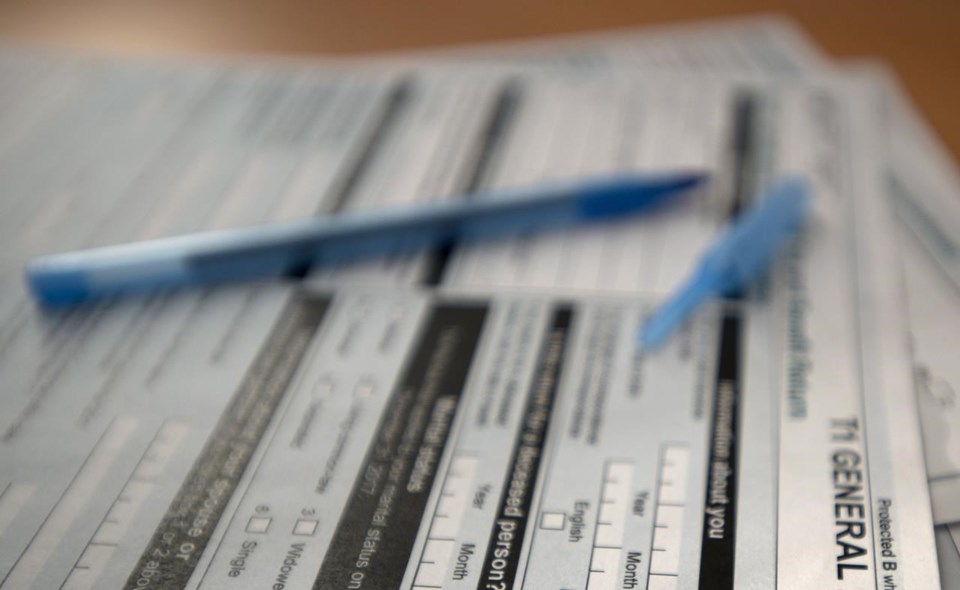The tax filing deadline has come and gone, and some Canadians are now facing a significant tax bill.
The Canada Revenue Agency is aware people may be struggling financially and might not have the means to pay that bill, said Charles Drouin, a spokesperson for the federal agency. He urges those who find themselves in that position to give the CRA a call.
"When you call the CRA, we'll be sensitive to that," he said in an interview. "We'll try to understand what your personal situation is and work with you."
Setting up a payment arrangement is at the top of the list. People can call and set it up with an automated teller or speak to a representative. It can also be done online through CRA's My Account.
The plan will likely involve dividing the payments into instalments over a period of time, such as 12 months.
Drouin said each situation is unique when setting up a payment plan.
When people think they might owe money to the Canada Revenue Agency, they prefer not to address the situation, said Yannick Lemay, a tax expert with H&R Block.
"This is completely the opposite of the mindset you should have toward your taxes," he said.
The deadline to file a personal income tax return was April 30, while those self-employed have until June 17. The self-employed filing deadline is usually June 15 but that falls on a weekend this year.
"There's a big 'but' here," said Lemay. Even though self-employed people have until mid-June to file taxes, they still have to pay any amount they owe to the CRA before April 30 to avoid accruing interest.
The penalty for filing your return late is five per cent of the 2023 balance owing, plus an additional one per cent for each month the return is overdue.
If you've filed your return late in the previous few years, the CRA will charge a 10 per cent late-filing penalty and an additional two per cent for each month the balance is overdue.
"Once you figure out the amount you owe to CRA, you don't want to ignore any letters you'll receive from (them)," Lemay said. "You'd want to be proactive about it."
If payments are not made, the CRA can begin tax collection — contacting the employer and seizing paycheques and bank accounts, Lemay said.
"You want to avoid it at all costs," he said.
If you're unable to pay, you could try requesting a waiver on penalties or interest, especially if the circumstances are beyond the taxpayer's control. But the CRA said it's decided on a case-by-case basis.
When a payment plan is not set up, the CRA can withhold credits and benefits, although some benefits, such as child benefits, are untouchable in this case.
Ken Poniatowski, a certified financial planner at AMS Wealth Inc., said many taxpayers are in a cash-flow crunch due to inflation and an economic slowdown but says they should look for alternative avenues to pay off tax-related debt as early as possible.
Tapping into one's RRSP if they're in a low tax bracket can help pay off the amount owing. But their income tax rate is key to this solution or it could create a bigger problem for the taxpayer, Poniatowski said.
"As an alternative, if someone has access to a line of credit with low enough interest rates, this may be considered as a potential solution," he said.
He warned credit cards should only be a last resort because of higher fees and interest.
But if someone has no income to pay the tax balance owing, Drouin suggested reaching out to a debt management centre and gauging their options.
Over the last few years, the gig economy and side hustles have made it easier for some to conceal their income as no T-slips are issued. But Drouin said people still have to report every dollar they make.
"You think you're not going to get caught and (so) you're not disclosing this information," he said. "Ultimately, you could be facing an audit." He added that not filing a return can escalate to legal challenges too.
Jessica Morgan, founder and CEO of blog site Canadianbudget.ca, said the ideal situation for people in gig work or freelancing is to open a separate bank account to squirrel away money for tax time.
"Put away 30 per cent of what you make freelancing or whatever is closest to your marginal tax rate," she said.
Saving a portion in a separate account that a person won't spend can save them from a big tax headache, Morgan said.
"In the case that you've over-saved, you have a nice bonus to keep for yourself."
This report by The Canadian Press was first published May 1, 2024.
Ritika Dubey, The Canadian Press




